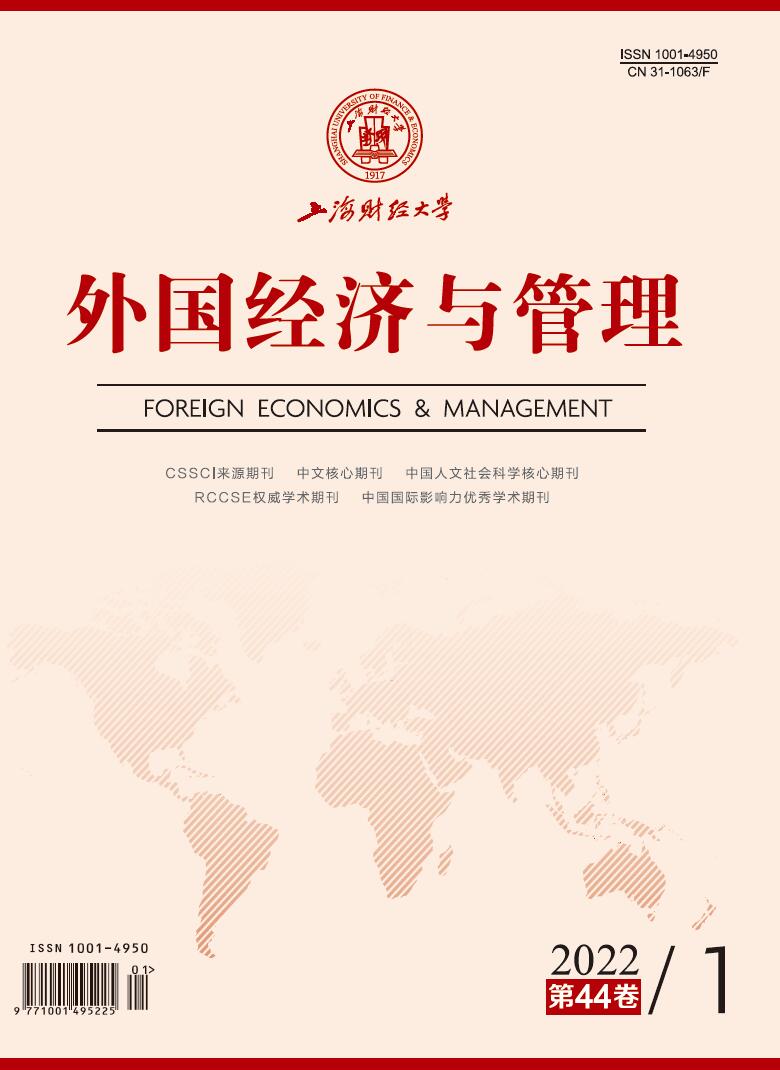理解东道国制度环境并选择与之相适应的管理方式对企业跨国经营获得成功具有重要影响。现有文献侧重于分析东道国规制制度和认知制度对企业跨国经营的影响,对规范制度研究较少。基于来自世界价值观调查的东道国社会信任数据以及中国上市公司2009—2018年在海外设立的6921个子公司的数据,本文探讨规范制度的核心维度——东道国社会信任如何影响中国企业对海外子公司的管控。本文提出东道国外群体社会信任和内群体社会信任影响企业跨国经营所面临的交易成本和不确定性,进而影响母公司对海外子公司的持股水平。此外,文化距离和母公司跨国经验是东道国社会信任效应的重要边界条件。本文通过揭示东道国社会信任影响海外子公司管控的理论机理,不仅增进了人们对于规范制度及其对企业跨国经营战略的影响的认识,还对企业评估东道国规范制度环境、科学地设计海外子公司的所有权结构具有启示意义。
东道国社会信任能降低企业跨国经营的不确定性吗?——以海外子公司所有权结构设计为例
摘要
参考文献
1 曹春方, 夏常源, 钱先航. 地区间信任与集团异地发展——基于企业边界理论的实证检验[J]. 管理世界,2019, 35(1): 179-191. DOI:10.3969/j.issn.1002-5502.2019.01.012
3 邓新明, 熊会兵, 李剑峰, 等. 政治关联、国际化战略与企业价值——来自中国民营上市公司面板数据的分析[J]. 南开管理评论,2014, 17(1): 26-43. DOI:10.3969/j.issn.1008-3448.2014.01.004
7 马德芳, 邱保印. 社会信任、企业违规与市场反应[J]. 中南财经政法大学学报,2016, (6): 77-84. DOI:10.3969/j.issn.1003-5230.2016.06.010
15 王根蓓, 赵晶, 王馨仪. 生产力异质性、市场化进程与在华跨国公司进入模式的选择——基于Ml-Binary Logit模型的实证分析[J]. 中国工业经济,2010, (12): 127-137.
25 Bjørnskov C, Méon P G. The productivity of trust[J]. World Development,2015, 70: 317-331. DOI:10.1016/j.worlddev.2015.01.015
26 Chan C M, Makino S. Legitimacy and multi-level institutional environments: Implications for foreign subsidiary ownership structure[J]. Journal of International Business Studies,2007, 38(4): 621-638. DOI:10.1057/palgrave.jibs.8400283
27 Chen W J, Kamal F. The impact of information and communication technology adoption on multinational firm boundary decisions[J]. Journal of International Business Studies,2016, 47(5): 563-576. DOI:10.1057/jibs.2016.6
28 Delhey J, Newton K, Welzel C. How general is trust in “most people”? Solving the radius of trust problem[J]. American Sociological Review,2011, 76(5): 786-807. DOI:10.1177/0003122411420817
29 Delhey J, Newton K, Welzel C. The radius of trust problem remains resolved[J]. American Sociological Review,2014, 79(6): 1260-1265. DOI:10.1177/0003122414555399
30 Demirbag M, Glaister K W, Tatoglu E. Institutional and transaction cost influences on MNEs’ ownership strategies of their affiliates: Evidence from an emerging market[J]. Journal of World Business,2007, 42(4): 418-434. DOI:10.1016/j.jwb.2007.06.004
31 Dinesen P T, Sønderskov K M. Ethnic diversity and social trust: Evidence from the micro-context[J]. American Sociological Review,2015, 80(3): 550-573. DOI:10.1177/0003122415577989
32 Ding Z J, Au K, Chiang F. Social trust and angel investors’ decisions: A multilevel analysis across nations[J]. Journal of Business Venturing,2015, 30(2): 307-321. DOI:10.1016/j.jbusvent.2014.08.003
33 Fukuyama F. Social capital, civil society and development[J]. Third World Quarterly,2001, 22(1): 7-20. DOI:10.1080/713701144
34 Hofstede G. Culture’s consequences[M]. Beverly Hills, CA: Sage Publications, 1980.
35 Jean R J B, Kim D, Cavusgil E. Antecedents and outcomes of digital platform risk for international new ventures’ internationalization[J]. Journal of World Business,2020, 55(1): 101021. DOI:10.1016/j.jwb.2019.101021
36 Kogut B, Singh H. The effect of national culture on the choice of entry mode[J]. Journal of International Business Studies,1988, 19(3): 411-432. DOI:10.1057/palgrave.jibs.8490394
37 Li Y, Hernandez E, Gwon S. When do ethnic communities affect foreign location choice? Dual entry strategies of Korean banks in China[J]. Academy of Management Journal,2019, 62(1): 172-195. DOI:10.5465/amj.2017.0275
39 Lu J W, Song Y Y, Shan M M. Social trust in subnational regions and foreign subsidiary performance: Evidence from foreign investments in China[J]. Journal of International Business Studies,2018, b,49(6): 761-773.
40 Lu J Y, Liu X H, Wright M, et al. International experience and FDI location choices of Chinese firms: The moderating effects of home country government support and host country institutions[J]. Journal of International Business Studies,2014, 45(4): 428-449. DOI:10.1057/jibs.2013.68
41 Martin X. Solving theoretical and empirical conundrums in international strategy research: Linking foreign entry mode choices and performance[J]. Journal of International Business Studies,2013, 44(1): 28-41. DOI:10.1057/jibs.2012.29
42 Meyer K E. Institutions, transaction costs, and entry mode choice in eastern Europe[J]. Journal of International Business Studies,2001, 32(2): 357-367. DOI:10.1057/palgrave.jibs.8490957
43 Nunn N, Wantchekon L. The slave trade and the origins of mistrust in Africa[J]. American Economic Review,2011, 101(7): 3221-3252. DOI:10.1257/aer.101.7.3221
44 Peng G Z, Beamish P W. The effect of host country long term orientation on subsidiary ownership and survival[J]. Asia Pacific Journal of Management,2014, 31(2): 423-453. DOI:10.1007/s10490-013-9362-8
46 Rothstein B, Uslaner E M. All for all: Equality, corruption, and social trust[J]. World Politics,2005, 58(1): 41-72. DOI:10.1353/wp.2006.0022
47 Sartor M A, Beamish P W. Host market government corruption and the equity-based foreign entry strategies of multinational enterprises[J]. Journal of International Business Studies,2018, 49(3): 346-370. DOI:10.1057/s41267-017-0115-7
48 Scott W R. Institutions and organizations[M]. Thousand Oaks, CA: Sage Publications, Inc. , 1995.
49 Sestu M C, Majocchi A. Family firms and the choice between wholly owned subsidiaries and joint ventures: A transaction costs perspective[J]. Entrepreneurship Theory and Practice,2020, 44(2): 211-232. DOI:10.1177/1042258718797925
50 Stevens C E, Dykes B J. The home country cultural determinants of firms’ foreign market entry timing strategies[J]. Long Range Planning,2013, 46(4-5): 387-410. DOI:10.1016/j.lrp.2013.06.003
51 Tihanyi L, Griffith D A, Russell C J. The effect of cultural distance on entry mode choice, international diversification, and MNE performance: A meta-analysis[J]. Journal of International Business Studies,2005, 36(3): 270-283. DOI:10.1057/palgrave.jibs.8400136
52 van Hoorn A. Trust radius versus trust level: Radius of trust as a distinct trust construct[J]. American Sociological Review,2014, 79(6): 1256-1259. DOI:10.1177/0003122414555398
53 van Hoorn A. Individualist–collectivist culture and trust radius: A multilevel approach[J]. Journal of Cross-Cultural Psychology,2015, 46(2): 269-276. DOI:10.1177/0022022114551053
54 Welzel C, Delhey J. Generalizing trust: The benign force of emancipation[J]. Journal of Cross-Cultural Psychology,2015, 46(7): 875-896. DOI:10.1177/0022022115588366
55 Wooldridge J M. Econometric analysis of cross section and panel data[M]. 2nd ed. Cambridge: MIT Press, 2010.
56 Xie Q Y. Firm age, marketization, and entry mode choices of emerging economy firms: Evidence from listed firms in China[J]. Journal of World Business,2017, 52(3): 372-385. DOI:10.1016/j.jwb.2017.01.001
57 Zhang M M, Beamish P W. An institutional response model to economic liberalization: Japanese MNEs’ownership choices in China[J]. Asia Pacific Journal of Management,2019, 36(1): 33-59. DOI:10.1007/s10490-017-9549-5
引用本文
雷玮, 陈妍, 吴琼. 东道国社会信任能降低企业跨国经营的不确定性吗?——以海外子公司所有权结构设计为例[J]. 外国经济与管理, 2022, 44(1): 16-34.
导出参考文献,格式为:





 6514
6514  8070
8070

